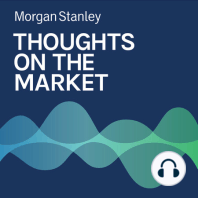4 min listen

Graham Secker: European Equities Face Earnings Concerns
Graham Secker: European Equities Face Earnings Concerns
ratings:
Length:
4 minutes
Released:
Sep 12, 2022
Format:
Podcast episode
Description
Even as the European equity market contends with inflation, a slowing economy and a climate of decreased earnings, there are positives to be found if you know where to look.-----Transcript-----Welcome to Thoughts on the Market. I'm Graham Secker, Head of Morgan Stanley's European Equity Strategy Team. Along with my colleagues, bringing you a variety of perspectives, I'll be talking about the outlook for European equity markets for the remainder of this year. It's Monday, September 12th, at 2 p.m. in London. After a brief rally in European equities earlier in the summer, reality has reasserted itself over the last month with markets unable to escape a tricky macro backdrop characterized by central banks speeding up rate hikes into what is a deepening economic slowdown. In the last couple of weeks alone, our economists have raised their forecasts for ECB rate hikes and cut their GDP numbers to signal a deeper upcoming recession. So let's dig into the investment implications of these challenges in a bit more detail. First on rates, over the last 20 years there has been a close relationship between interest rates and equity valuations, whereby higher rates lead to lower price to earnings ratios. Hence, the fact that central banks are still in the early stages of their hiking cycle suggests a high probability that PE ratios have further to fall. In addition to higher base rates, the pace of quantitative tightening is also speeding up, and our bond strategists forecast higher sovereign yields ahead. Here in Europe, they see ten year bond yields rising to 2% or more later this year, which will be consistent with a further fall in Europe's PE ratio to around 10x or so. That would imply 15% lower equity prices from here. Second, we expect the European economy to slow over the next couple of quarters and this should put pressure on corporate profits which have been resilient so far this year, thanks to strong commodity sector upgrades and a material boost from the weakness we've seen in the euro and sterling. Looking forward, our models are flagging large downside risks to consensus earnings estimates for the next 12 to 18 months and we are 16% below consensus by the end of 2023. To provide some additional context, we note that consensus expects European earnings, excluding the commodity sectors, to grow faster next year than this year. This acceleration looks odd to us when you consider that our economists see slower GDP growth in 23 than 22, and our own margin lead indicator is suggesting we could face the largest year on year drop in corporate margins since the global financial crisis. Our concern on earnings is a significant factor behind our continued preference for defensives over cyclicals. While some investors argue that the latter group are now sufficiently cheap to buy, we question the sustainability of the earnings that is underpinning the low PE ratios given the, first, we have seen very few downgrades so far. Second, margins are currently at record highs for many of these cyclical sectors. And then lastly, cyclicals tend to see larger earnings declines during downturns than the wider market. This gives rise to the old adage that investors should buy cyclicals on high PE ratios, not low ones. Consistent with this view, we have recently downgraded three cyclical sectors to underweight from our top down perspective, these being autos, capital goods and construction. We are also underweight chemicals and retailing. So what do we like instead? Sectors with more defensive characteristics, such as health care, insurance, telecoms, utilities and energy. We also like stocks that offer a high and secure cash return yield, whether that be driven by dividends, buybacks or both. To end on a positive note, the level of buyback activity in Europe has never been stronger than what we are seeing today, whether we measure it by the number of companies that are repurchasing their shares or the amounts of money they are spending to do so. In a
Released:
Sep 12, 2022
Format:
Podcast episode
Titles in the series (100)
Mike Wilson: Weighing a Potential Fed Rate Cut by Thoughts on the Market